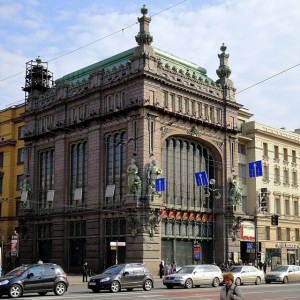
The Eliseev Emporium is the most famous remaining shop that belonged to the successful Eliseev merchant family. This building was constructed in 1895 and also housed a theatre. Today it houses the Theatre of Comedy and an upmarket food court bearing the Eliseev name.
St. Petersburg has always been a city of trade. Throughout the centuries royalty and nobility have attracted merchants who have grown rich importing fine goods to the best families and exporting raw materials throughout Europe. Among these merchant families there are few that better known or have had a more visible presence on the city than the Eliseev family.
The founding father of this mercantile family was Petr Kasatkin, a serf and gardiner to Count Nikolai Sheremetov. On Christmas Eve in 1811, the young serf presented the count and his guests with a plate of strawberries. Count Sheremetov was so surprised by this remarkable feat that he asked the serf what he would like as a reward. Petr Kasatkin requested his freedom, which was given along with 100 roubles, which at that time was a considerable sum.
Petr Kasatkin and his wife moved to St. Petersburg and took a room in a cheap hotel which he shared with cockroaches and bedbugs. The next day, instead of looking for work, Petr went to the market and bought a bag of oranges, a tray and headed off to Nevsky Prospekt to sell the oranges on the street. Initially hampered by shyness, Kasatkin was a born salesman and by the end of the day was shouting at the top of his voice “Who wants to treat their lady to an orange? One kopeck! Why that’s not money? Who can’t spare a kopeck to treat their lady to an orange?” During the course of the day he had made a rouble.
The business model was a success and by fall of 1812 he rented a small shop at Nevsky Prospekt 18 where he sold rare, tropical fruit. By living cheap and working hard the enterprising grocer ended the year with a profit of 130 roubles and was able to buy his brother’s freedom from Count Sheremetov.
With the assistance of his brother and his children Petr Kasatkin’s business grew at a phenomenal rate. However, the family was not content with tropical fruits and soon branched out into fine wines. Petr Kasatkin even took trips overseas and soon became a connoisseur in fine wines, even spending time on Madeira to learn the finer points of making wine and tasting it – legend has it that he arrived back in St. Petersburg still drunk from his experience. They built a huge store-room of almost seven square kilometres for their wines at Birzhevaya Liniya 14-16 on Vasilevsky Island. The family entered into direct contact with suppliers from around the world and bought produce for the nobility. Even the exiled French nobility turned to his shop to buy fine wines. To support this international trade network Petr’s children learnt several foreign languages. In 1824 the family had acquired sufficient wealth to be registered as being members of St. Petersburg’s mercantile class and were included under the Eliseev name. Petr did not life to enjoy his newly claimed status long. He died the following year.
The family business was continued under the vigilant eye of his widow, Mariya. She strove to maintain and enhance the company’s enviable reputation with only the finest goods being allowed onto the company’s shelves. To protect their reputation no fruit was allowed to be thrown out for fear of rumours going round that “the Eliseevs had spoilt goods”, consequently the staff were obliged to eat any fruit that was in danger of going off.
The family business continued to improve throughout the 19th century – with members of the family becoming involved in banking, real estate and municipal politics. The Eliseevs also donated considerable sums to educational institutions, hospitals, and almshouses. Among the more notable buildings in St. Petersburg is Nevsky Prospekt 56 which now houses the Theatre of Comedy, and from 1858 to 1917 the building on the corner of Nevsky Prospekt 15 and the Moika Embankment (now the Taleon Imperial Hotel) was the family house. However as with many dynasty’s, it only lasted three generations. At the height of their opulence, when the family had opened shops in Moscow and Kiev and were considering the American market, they held their 100th jubilee, at which the family patriarch Gregory Eliseev, then 54, fell in love with the 20 year old wife of a young merchant. Demanding a divorce from his wife, she refused to give it and eventually committed suicide. Within two weeks of her death he married his newly beloved. His two sons disowned and refused their inheritance. The family business already going into decline was brought to an abrupt closure with the 1917 Revolution. Grigory and his young wife left Russia for France and his two sons fell foul of the repression and were shot in the 1930s.
Despite the sudden end to this remarkable family – the story of the Eliseevs is a happy reminder of the profits that can be reaped by good management, branding and an eye for quality.
This is an extended version of an article published by The St. Petersburg Times on 23 May 2014.
Be sure to like Intrepid Adventure on Facebook and check out Peter Campbell’s latest books on Amazon.com.
Copyright © Peter Campbell 2014, www.intrepid-adventure.com



